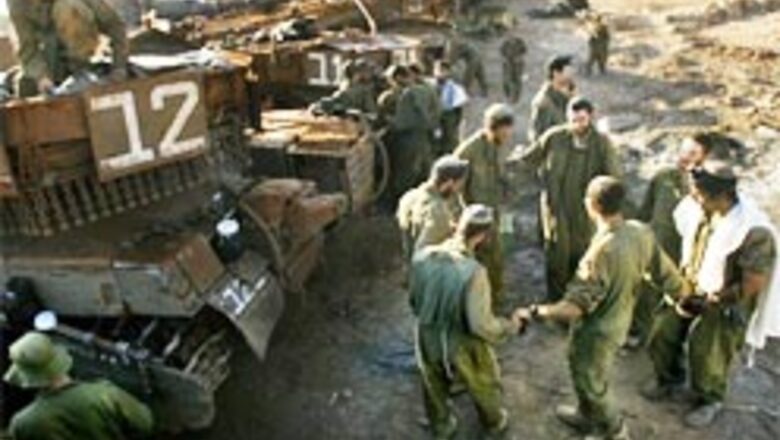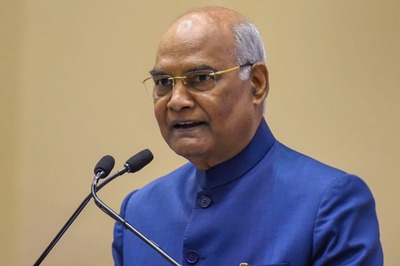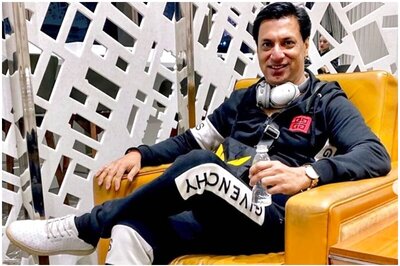
views
Beirut (Lebanon): A UN-brokered cease-fire took effect on Monday morning on the 34th day of fighting between Israel and Hezbollah, although both sides launched final attacks only minutes ahead of the deadline.
In the meantime, Israel promised to keep a tight rein on the region with military officials saying the army will continue enforcing the air and sea embargo on Lebanon.
Just two hours before the truce started, Israel papered Beirut with propaganda leaflets, blaming Hezbollah for bringing "destruction, displacement and death" to Lebanon and calling the militant group a puppet of Iran and Syria.
Israel and Hezbollah continued to trade blows across southern Lebanon and northern Israel as the clock ticked toward the 0500 hrs GMT, trying to inflict as much maximum damage as possible in the final hours of the conflict.
Israel reported that 250 rockets hit its territory, killing at least one person, and five Israeli soldiers died fighting Hezbollah guerrillas in southern Lebanon.
The Israel Defence Forces meanwhile, launched what appeared to be one of the heaviest bombardments on southern Lebanon to date and struck targets in Beirut's southern suburbs.
Lebanese civil defence officials also reported eight people dead and 16 wounded in an airstrike on the Bekaa Valley town of Brital, and three killed and seven wounded near the eastern town of Ali al-Nahri, identifying the dead as civilians.
Israel has described the locations as being strongholds for the Hezbollah militia.
Civil defence sources also told CNN of an airstrike on a road between the village of Jammaliya and the city of Baalbeck. The sources said there are casualties and that rescue workers were en route.
In a parting propaganda shot, Israel promised more of the same if Hezbollah continues to operate from southern Lebanon.
"Hezbollah, with it isolationist, reckless and deceitful policies has brought you many achievements: destruction, displacement, and death," the leaflets dropped over Beirut said.
"Can you pay this price again?"
"Know that the Israel Defence Forces will return and will act with all necessary might against any terrorist act coming from Lebanon that touches Israel."
'Days of uncertainty'
Despite widespread hope that the cease-fire will bring a halt to the violence, it was unclear what really lay ahead.
PAGE_BREAK
"The next few days are days of uncertainty," said Major General Benny Gantz, the chief of Israeli ground forces.
Gantz said Israel will adhere to the cease-fire if Hezbollah does not fire at its forces or civilians -- "But if fire is renewed against our forces and against the Israeli civilian population, we will be able to and know how to and will not hesitate to operate," he said.
In the meantime, former Israeli Prime Minister Ehud Barak told CNN earlier on Sunday: "It's time to do all we can to destroy as much as we can of the infrastructure in the next 12 or 13 hours, and then we'll see what is next."
But Nouhad Mahmoud, the Lebanese representative to the United Nations, countered: "I don't understand why we need this grand finale."
He questioned what Israel thinks it could achieve in a matter of hours "that they couldn't achieve in one month."
Mahmoud acknowledged that Hezbollah set off the conflict, when its militants crossed into Israel July 12, killing three Israeli soldiers and kidnapping two others.
"They just started it, and the Israelis took the rest," he said.
Israel said at least 114 military personnel and 53 civilians have been been killed, and 865 civilians have been wounded.
The IDF said its troops had killed more than 530 Hezbollah fighters, releasing the names of 180 of them. But Lebanon said most of the 890 people killed before Sunday's bombardments were civilians.
According to Israeli police, nearly 4,000 Hezbollah rockets hit northern Israel.
Sticking point over disarming Hezbollah
Monday's cease-fire is part of a peace plan approved by the UN Security Council on Friday. It calls for Lebanese government troops and a UN peacekeeping mission to move into southern Lebanon as Israeli troops withdraw, taking control of the Israeli-Lebanese border from Hezbollah.
However, the Lebanese government postponed a meeting on the plan's implementation for up to two days.
A Lebanese government minister said the postponement came at the request of parliamentary speaker Nabih Berri, a key negotiator with Hezbollah, to give government officials more time to discuss the plan with Hezbollah -- but sources in Berri's office denied that report.
PAGE_BREAK
Two Hezbollah members of the Lebanese Cabinet said on Saturday the militia wanted to keep its weapons south of the Litani River -- a zone the UN resolution calls for demilitarising.
Yet the Cabinet unanimously approved the resolution, with Hezbollah leader Hassan Nasrallah indicating the two Hezbollah ministers voted for it in a spirit of national unity.
A government minister said there were disagreements over Hezbollah's disarmament south of the Litani, and told CNN he was losing optimism for the resolution.
The postponement sparked concern worldwide among leaders with high hopes for the resolution. A senior Lebanese government source said Prime Minister Fouad Siniora received calls from US Secretary of State Condoleezza Rice, Egyptian President Hosni Mubarak, French President Jacques Chirac and UN Secretary-General Kofi Annan.
The source said Annan told Siniora that if Hezbollah maintains its position against disarmament south of the Litani, an international force can't go into Lebanon.
Israel said on Sunday it planned to abide by the resolution, which calls on Israel to halt "offensive" military actions.
"This is our full and unequivocal intention," said Isaac Herzog, Israeli minister of tourism and a member of the Cabinet, which Sunday approved UN Resolution 1701.
But Israeli officials also acknowledged it remains unclear what actions could be construed as "offensive."
"What if some trucks will come from Syria with new launchers and rockets? If we attack them, some might say it's not defensive," said Barak. "If we don't, it will end up with just another opportunity for Hezbollah to regroup."
Israel has made clear it will not immediately pull out of southern Lebanon but will wait until other forces arrive to prevent the Hezbollah militia from again taking over the area on Israel's northern border.
"We ask that there not be a vacuum -- in other words, that there not be a situation in which the IDF exits and there remains a vacuum there and the Hezbollah returns to those places where it left, or alternately remains in those places and nothing actually happens," Israeli Foreign Minister Tzipi Livni said on Sunday.




















Comments
0 comment